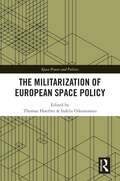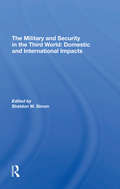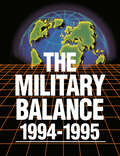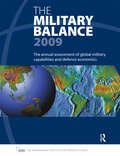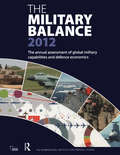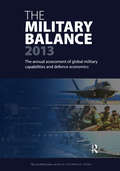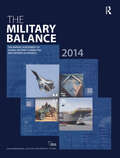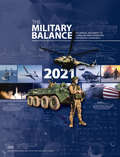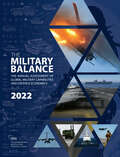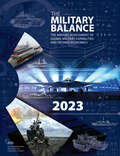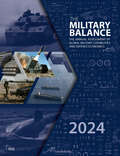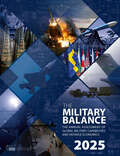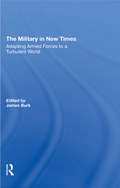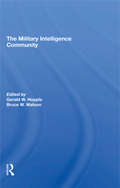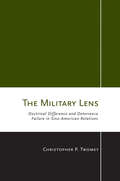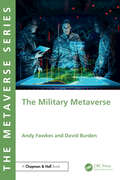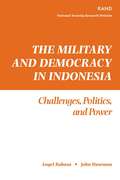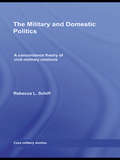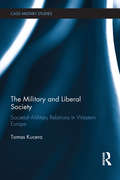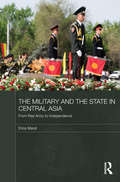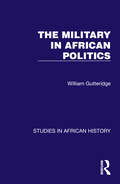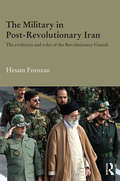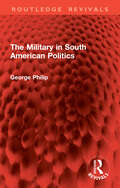- Table View
- List View
The Militarization of European Space Policy (Space Power and Politics)
by Iraklis Oikonomou Thomas HoerberThis book is focused on militarization as the nucleus of EU space policy and the interrelatedness of European security, industrial competitiveness, and military capabilities in the shaping of this policy. The EU and key member states have increasingly joined the US, China and Russia, among others, in regarding space assets as critical military, as well as economic, industrial, and technological, enablers. This book tackles this issue by, first, shedding light on the military aspects of EU space policy, with special emphasis on the security and defence dimensions of projects such as Galileo, Copernicus, Space Situational Awareness, and Satellite Communication. In this context, contributors confront the empirical aspect of developments, including the role of different institutional actors and the involvement of specific member states. Further, the volume analyses the discursive, ideological, normative, and theoretical foundations of the use of space by the EU for strategic purposes, drawing on the broad spectrum of European integration/International Relations theory. Last, but not least, the volume discusses initiatives outside the EU by key global space players, with an emphasis on the US and transatlantic space relations. All chapters maintain a solid empirical foundation, in the form of geographical or issue-related focus, with an area-specific emphasis on the EU as a whole, transatlantic relations, the policies of key member states (such as France and Italy), and core space powers such as the US, China and India. This book will be of much interest to students of space power, security studies, European politics and International Relations.
The Military And Security In The Third World: Domestic And International Impacts
by Sheldon W. SimonThis book explores two of the most important dimensions of the military as an institution in Third World politics: its role in domestic power structures and internal development, and its impact on the formation and execution of the security aspects of foreign policy. These internal and external orientations are compared here across selected Third World countries in Asia, Africa, and Latin America. The authors are area experts and specialists in comparative and international politics. Part 1 focuses on how the interaction of military and civilian elites creates a specific domestic political climate. The socioeconomic characteristics of these elites are compared and related to their policy preferences. An examination of military establishments in regimes ranging from communist (Cuba) through business-oriented (Indonesia) reveals whether military similarities persist among differing types of government. In Part 2 the contributors examine the role of military force in the Third World through a general empirical treatment of military behavior in developing countries; an assessment of the security policies–with emphasis on their military components–of several Middle Eastern and Asian states; and an evaluation of the U.S. experience in supporting anti-communist Third World security efforts.
The Military Balance 1975-1976
by Institute For InternationalThe Military Balance is an annual, quantitative assessment of the military power and defence expenditure of countries throughout the world. It examines the facts of military power as they existed in July 1975, and no projections of force levels or weapons beyond this date have been included, except where explicitly stated. The study should not be regarded as a comprehensive guide to the balance of military power; in particular, it does not reflect the facts of geography, vulnerability or efficiency, except where these are touched upon in the section on the balance in Europe.
The Military Balance 1994-1995 (The\military Balance Ser.)
by Neaman RachelFirst published in 1995. The Military Balance is updated each year to provide a timely, quantitative assessment of the military forces and defence expenditures of over 160 countries. The current volume contains as of 1 June 1994. The break-up of the Soviet Union necessitated a re-evaluation of the way in which The Military Balance divides the world into geographical sections. Russia is both a European and an Asian state and is given a separate section in the book.
The Military Balance 2009 (The Military Balance)
by James Hackett Dr John ChipmanThe Military Balance is The International Institute for Strategic Studies annual assessment of the military capabilities and defence economics of 170 countries worldwide. It is an essential resource for those involved in security policymaking, analysis and research. The book is a region-by-region analysis of the major military and economic developments affecting defence and security policies, and the trade in weapons and other military equipment. Comprehensive tables detail major military training activities, UN and non-UN deployments, and give data on key equipment holdings and defence-expenditure trends over a ten year period. Key Features: Region-by-region analysis: major military issues affecting each region, changes in defence economics, weapons and other military equipment holdings and the trade in weapons and military equipment Comprehensive tables: key data on weapons and defence economics, such as comparisons of international defence expenditure and military manpower Analysis: significant military and economic developments Wallchart: detailed world map that shows current areas of conflict, with explanatory tables. This new edition of The Military Balance provides a unique compilation of data and information enabling the reader to access all required information from one single publication.
The Military Balance 2012
by The International Institute for Strategic Studies (IISS)The Military Balance is the International Institute for Strategic Studies annual assessment of the military capabilities and defense economics of 170 countries worldwide. It is a useful resource for those involved in security policy making, analysis and research.The book is a region-by-region analysis of the major military and economic developments.
The Military Balance 2013
by The International Institute for Strategic Studies (IISS)The Military Balance 2013 is the annual assessment of the military capabilities and defence economics of 171 countries world-wide. New features of the 2013 edition include; reorganised and expanded analytical essays. New sections on trends in contemporary armed conflicts in Afghanistan and Syria, as well as trends in defence capability areas, with a focus on equipment, technological or doctrinal developments. There is also an essay on trends in defence economics and procurement, one on European defence industries, and another on anti-access/area denial, detailed analysis of regional and national defence policy and economic issues for selected states, updated graphics feature on comparative defence statistics, with focus on defence economics, and major land, sea and, air capability concerns, tables, graphics and analysis of defence economics issues, additional national capability summaries, additional data on, land forces: combat support and combat service support, new graphics and maps on defence capability issues and additional data on cyber capabilities.
The Military Balance 2014 (The\military Balance Ser.)
by The International Institute for Strategic Studies (IISS)The Military Balance 2014 contains region-by-region analysis of the major military and economic developments affecting defence and security policies and the trade in weapons and other military equipment. Detailed entries describe the military capabilities of 171 countries, displaying key equipment inventories and defence economics. Comprehensive tables detail major training activities, UN and non-UN deployments, and international comparisons of defence expenditure and military personnel.
The Military Balance 2021 (The Military Balance)
by The International Institute for Strategic Studies (IISS)Published each year since 1959, The Military Balance is an indispensable reference to the capabilities of armed forces across the globe. It will be of interest to anyone interested in security and military issues and is regularly consulted by academia, media, armed forces, the private sector and government. Key Elements: 1. Data on the military organisations, equipment inventories and defence budgets of 171 countries 2. Analysis of major developments affecting defence policy and procurement, and defence economics, arranged region-by-region. 3. Key trends in the land, sea and air domains, and in cyberspace 4. Selected defence procurement programmes, arranged region-by-region 5. Full-colour graphics including maps and illustrations 6. Extensive explanatory notes and references 7. The hardcopy edition is accompanied by a full-colour wall chart Features in the 2021 edition include: - Analytical texts on future maritime competition, battle management systems, China’s civil-military integration and fractures in the arms-control environment - Military cyber capabilities - Analysis of developments in defence policy, military capability and defence economics and industry for China, Egypt, Finland, Indonesia, Russia, Senegal and the United States. - A wallchart illustrating global submarine holdings and key trends in subsurface warfare
The Military Balance 2022 (The Military Balance)
by The International for Strategic Studies (IISS)Published each year since 1959, The Military Balance is an indispensable reference to the capabilities of armed forces across the globe. It is used by academia, the media, armed forces, the private sector and government. It is an open-source assessment of the military forces and equipment inventories of 171 countries, with accompanying defence economics and procurement data. Alongside detailed country data, The Military Balance assesses important defence issues, by region, as well as key global trends, such as in defence technology and equipment modernisation. This analysis is accompanied by full-colour graphics, including maps and illustrations. With extensive explanatory notes and reference information, The Military Balance is as straightforward to use as it is extensive. The 2022 edition is accompanied by a fullcolour wall chart illustrating security dynamics in the Arctic.
The Military Balance 2023 (The Military Balance)
by The International for Strategic Studies (IISS)The Military Balance has been published annually since 1959. The 2023 edition provides an open-source assessment of the armed forces and equipment inventories of 173 countries, with accompanying defence economics data. Alongside detailed country data, The Military Balance assesses important military issues, region-by-region, and includes graphics to illustrate these as well as noteworthy equipment developments. Maps this year include a focus on Russia’s full-scale invasion of Ukraine and select China-Russia military cooperation activities. The book draws on the range of data carried in the Military Balance+ online database, particularly the procurement features in each regional section. The accompanying wallchart explores the military use of outer space, an increasingly important element of defence capabilities, focusing on China, Russia and the United States. For those involved in defence and security policymaking, analysis and research, The Military Balance is an indispensable source.
The Military Balance 2024 (The Military Balance)
by The International for Strategic Studies (IISS)The Military Balance has been published since 1959. The 2024 edition provides an open-source assessment of the armed forces and equipment inventories of over 170 countries, with accompanying defence economics data. In addition to detailed country data, The Military Balance assesses, region-by-region, important military issues. It includes graphics to illustrate defence personnel, equipment, and procurement developments. The 65th edition examines emerging lessons from Russia’s full-scale invasion of Ukraine, details Chinese military activity around Taiwan, and identifies developments in uninhabited aerial vehicle exports. The accompanying wallchart spotlights the important issues around critical national infrastructure in the Euro-Atlantic. The book draws on the breadth of data in the Military Balance+ online database. The Military Balance and Military Balance+ are indispensable sources of information for those involved in defence and security policymaking, analysis, and research.
The Military Balance 2025 (The Military Balance)
by The International for Strategic Studies (IISS)The Military Balance has been published since 1959. The 2025 edition provides an open-source assessment of the armed forces and equipment inventories of over 170 countries, with accompanying defence economics data. In addition to detailed country data, The Military Balance includes graphics to illustrate defence personnel, equipment and procurement developments. It assesses important defence issues, by region, including Russia’s continuing invasion of Ukraine, the diverse range of ballistic and cruise missiles used by the Houthis, and developments in defence industrial production. The accompanying wallchart focuses on China’s armed forces, detailing selected unit locations and assessing the status of important aspects of PLA modernisation. The book draws on the breadth of data in the Military Balance+ online database. The Military Balance and Military Balance+ are indispensable sources of information for those involved in defence and security policymaking, analysis and research.
The Military In New Times: Adapting Armed Forces To A Turbulent World
by James Burk Robert J Waldman David R Segal Charles C MoskosWhat role will armed forces play in a world that is turbulent yet no longer organized by the bipolar conflict of East and West? In this volume, leading experts from several disciplines assess the rapidly changing global strategic and cultural landscape, examining how it will affect the responsibilities and social standing of the modern military. There are provocative disagreements among the contributors, especially over whether we should expect and prepare for another global war. However, the contributors generally agree on several broad themes that guide their analysis. Arguing that the Cold War has masked basic trends that have been reshaping the international system for a long time, they suggest that the sovereign states' dominance of the international system is rapidly coming to an end, as multinational, ethnic, regional, and religious groups–to name a few–increasingly affect the course of global affairs. In the absence of a clear "enemy," the military faces an identity crisis. In the postmodern atmosphere of this multicentric global order, authority is fragmented, and the exercise of any one authority is subject to greater scrutiny and challenge. The military has become more accepting of a variety of values, life-styles, and attitudes toward its tasks. At the same time, support for the military's mission is difficult to win, requiring endless justification. The authors believe that the principal missions for the military in these new times are peacekeeping, peacemaking, and humanitarian assistance. They examine the prospects for successful operations in these areas, taking into account the cultural lag between world structures that favor increased multinational peacekeeping forces and individual nations that supply token resources to support such efforts. This volume provides a sophisticated and thought-provoking perspective on the future role of the military in the coming decades. It is sure to enrich the vigorous debate surrounding these issues.
The Military Intelligence Community
by Bruce W. Watson Gerald W. HoppleThe military intelligence co11111unity is one of the most misunderstood and maligned facets of the U.S. government. To much of the American public, intelligence means an organization of James Bonds, sophisticated, super-individualists, John Waynes who live slightly beyond the law. To others, military intelligence is considered as a constant threat to American democracy, a danger that must be contained and minimized.
The Military Lens: Doctrinal Difference and Deterrence Failure in Sino-American Relations (Cornell Studies in Security Affairs)
by Christopher P. TwomeyIn The Military Lens, Christopher P. Twomey shows how differing military doctrines have led to misperceptions between the United States and China over foreign policy—and the potential dangers these might pose in future relations. Because of their different strategic situations, histories, and military cultures, nations may have radically disparate definitions of effective military doctrine, strategy, and capabilities. Twomey argues that when such doctrines—or "theories of victory"—differ across states, misperceptions about a rival's capabilities and intentions and false optimism about one's own are more likely to occur. In turn, these can impede international diplomacy and statecraft by making it more difficult to communicate and agree on assessments of the balance of power. When states engage in strategic coercion—either to deter or to compel action—such problems can lead to escalation and war. Twomey assesses a wide array of sources in both the United States and China on military doctrine, strategic culture, misperception, and deterrence theory to build case studies of attempts at strategic coercion during Sino-American conflicts in Korea and the Taiwan Strait in the early years of the Cold War, as well as an examination of similar issues in the Arab-Israeli conflict. After demonstrating how these factors have contributed to past conflicts, Twomey amply documents the persistence of hazardous miscommunication in contemporary Sino-American relations. His unique analytic perspective on military capability suggests that policymakers need to carefully consider the military doctrine of the nations they are trying to influence.
The Military Metaverse
by David Burden Andy FawkesThe Military Metaverse explores the impact that the Metaverse is having today on how the world's militaries procure, maintain, train, plan and fight, and how the Metaverse presents new challenges and opportunities for future conflict.The military were early adopters of Virtual Reality and Augmented Reality technologies and wider simulation systems. Before 2010 they were one of the few sectors that could afford the technology, and millions of military R&D dollars went into developing and understanding these technologies. However, as the democratisation of metaverse technologies has happened over the past decade there is a danger that militaries have been overtaken and caught short, encumbered with expensive legacy systems, sold and maintained by expensive prime contractors, whilst the gaming and consumer market has cheaper and more innovative and agile systems. The book provides a history of the use of metaverse technologies in the military, particularly in the areas of design, maintenance, training, planning and operations. It then examines the current state of the art in these areas and the opportunities that are available from the current generation of consumer-driven approaches. The drivers for, challenges to, and paths towards an enterprise approach to the Military Metaverse are then presented. The book explores the military use of social virtual worlds, of early work done by defence and security organisations in worlds such as Second Life, and how such environments could become important for intelligence as well as influence operations in the future. Finally, the book will consider what war in the Metaverse might look like, both in terms on in-world activities and the impact of cyber-war on the Metaverse itself.It should be of interest to all militaries across the world, the industries that support them, and those in academia and the wider public with an interest in the military and defence.
The Military and Democracy in Indonesia: Challenges, Politics, and Power
by Angel Rabasa John HasemanThe military is one of the few institutions that cut across the divides of Indonesian society. As it continues to play a critical part in determining Indonesia's future, the military itself is undergoing profound change. The authors of this book examine the role of the military in politics and society since the fall of President Suharto in 1998. They present several strategic scenarios for Indonesia, which have important implications for U.S.-Indonesian relations, and propose goals for Indonesian military reform and elements of a U.S. engagement policy.
The Military and Domestic Politics: A Concordance Theory of Civil-Military Relations (Cass Military Studies)
by Rebecca L. SchiffThe intervention of the military in national politics and the everyday lives of citizens is a key question in civil-military relations. This book explains how concordance theory can provide a model for predicting such domestic intervention.Models dealing with the relationship between the military and society are usually based on Western nations wit
The Military and Liberal Society: Societal-Military Relations in Western Europe (Cass Military Studies)
by Tomas KuceraThis book describes to what extent and in what ways the military policies of Western European societies are determined by liberal ideology. A wide variety of issues affected by liberal ideology, including conscription, conscientious objection, military mission, military ethics and the professional identity of soldiers are addressed in the book. The empirical analysis draws on the cases of the German Bundeswehr (from the 1950s onwards), the Swedish Armed Forces (the transformation after the end of the Cold War), and the British Armed Forces (from the beginning of the twentieth century onwards). The book’s examination of these cases reveals that specific policies, institutions and practices are preferred because of their relation to liberalism. Since Samuel Huntington’s seminal book The Soldier and the State the literature on civil-military relations and military sociology depicts the relationship between liberal ideology and military security as intrinsically antithetical. This book is conceived as a critical debate with Huntington. Contrary to the notion of antithetical societal-military relationship, this book demonstrates that a meaningful adaptation of the military to the principles possessed by its parent society can be, more often than not, desirable also from the perspective of security strategy. This book will be of considerable interest to students of civil-military relations, military sociology, Western European politics, security studies and IR.
The Military and Modernization (Controversy Ser.)
by Henry BienenThere is a growing body of work on the military in developing countries. Few studies, have explored in-depth questions concerning the social origins of offi cers and enlisted men or trace career patterns within the armed forces of the developing world. With the exception of Latin America, it has been rare for a study to assess the performance of ruling, or non-ruling, militaries for political development and modernization of their societies. Th is oversight is exactly what Henry Bienen addresses in this collection.
The Military and the State in Central Asia: From Red Army to Independence (Central Asian Studies)
by Erica MaratThe military played a pivotal role in the political development, state functions, foreign policy and the daily lives of the people in the Central Asian states from the early twentieth century until the present. This book is the first major, in-depth study of the military institutions in Central Asian states. It examines their hidden story, the different stages of their development from the early twentieth century until the present, and the influence they had on the state and society. It effectively combines history, sociology of the military and political science and provides deeper insights into how recently formed states function. By concentrating extensively on the military, this book is an important and a timely contribution to a wide range of disciplines including Central Asian studies, and post-colonial state and nation-building studies.
The Military in African Politics
by William GutteridgeOriginally published in 1969, this book assesses the origin and nature of the 20th Century trend towards military intervention in the politics of African states. It begins by examining the natures of African armies and their inheritance from the colonial period. It scrutinizes the Nigerian and Ghana coups of 1966 and aspects of the East African mutinies in 1964 as well as events in certain French territories including Gabon and Dahomey. The effect of foreign military aid on the role of the armed forces in Africa is analysed, including the subtle influence of overseas military experience. The problems facing army officers when they seize the reins of government are examined along with the difficulties which they encounter when attempting to reinstitute civilian rule. Throughout the book the qualities which enable armies to intervene in politics are reviewed and related to those of the other institutions of African society.
The Military in Post-Revolutionary Iran: The Evolution and Roles of the Revolutionary Guards (Durham Modern Middle East and Islamic World Series)
by Hesam ForozanIran's Revolutionary Guard Corps, also known as the 'Sepah', has wielded considerable and increasing power in Iran in recent decades. Established in 1979 by Ayatollah Khomeini as a paramilitary organisation charged with protecting the nascent Islamic regime and countering the untrustworthy Imperial army (or 'Artesh'), the Sepah has evolved into one of the most powerful political, ideological, military and economic players in Iran over recent years. The Sepah is entrusted with a diverse set of indoctrination apparatus, training programmes and system welfare provisions intended to broaden support for the regime. Although established as a paramilitary organisation, the Sepah developed to have its own ministry, complex bureaucracy and diversified functions, alongside its own network and personnel. This book provides a comprehensive overview of the Sepah and its role. It examines the position of the Sepah in Iranian state and society, explores the nature of the Sepah's involvement in politics, and discusses the impact of the Sepah's political rise on Iran's economy and foreign policy. Contemporary Iran can only be fully understood by an awareness of the ongoing in-fighting among regime factions and increasing popular demands for social change – knowing about the Sepah is central to all this.
The Military in South American Politics (Routledge Revivals)
by George PhilipFirst published in 1985, The Military in South American Politics analyses the nature of military involvement in politics in Latin America. The author presents many original arguments in the course of his discussion of the key issues. These include: the civil-military system, whereby the military exert power and influence even when they are not in government; how this system and also military professionalism have developed over time; how the “corporatist” ethic of South America military differs from the “partisan” ethic of the military in Central American and Caribbean countries and the consequences of this; how there are different types of coups; how the military find it difficult to disengage; how the military often intervene to exercise the principle of “guardianship” in order to preserve the fabric of society and economy which, in South America, are remarkably stable despite the many coups. Throughout, the author draws on examples from all Latin American countries from the middle of the nineteenth century onwards and summarises the existing literature to support his rich and convincing arguments. The book concludes with a summary of the arguments and with a discussion of trends and the prospects for “real” democratisation. It is a must read for students and researchers of Latin American politics and military studies.
